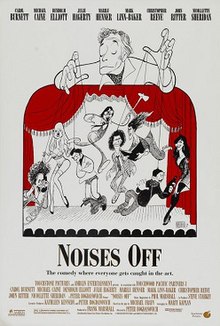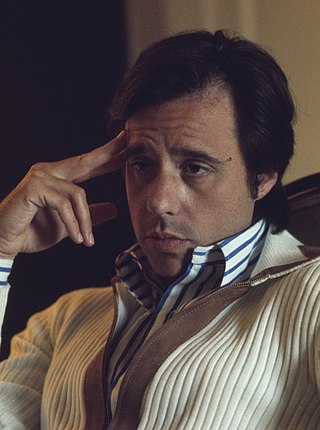
Peter Bogdanovich was an American director, writer, actor, producer, critic, and film historian. He started his career as a film critic for Film Culture and Esquire before becoming a prominent filmmaker as part of the New Hollywood movement. He received accolades including a BAFTA Award and Grammy Award, as well as nominations for two Academy Awards and two Golden Globe Awards.
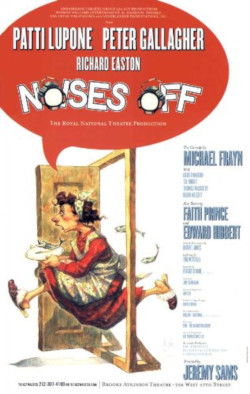
Noises Off is a 1982 farce by the English playwright Michael Frayn.

Carol Creighton Burnett is an American comedian, actress, and singer. Her comedy-variety show The Carol Burnett Show, which originally aired on CBS, was one of the first to be hosted by a woman. She has performed on Broadway, on television, and in film of varying genres, including dramatic and comedic roles. She has received numerous accolades, including seven Primetime Emmy Awards, a Tony Award, a Grammy Award, and seven Golden Globe Awards. Burnett was awarded the Presidential Medal of Freedom in 2005, the Mark Twain Prize for American Humor in 2013, and the Screen Actors Guild Life Achievement Award in 2015.
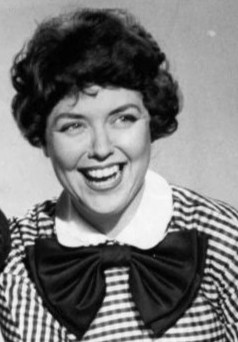
Dorothy Loudon was an American actress and singer. She won the Tony Award for Best Lead Actress in a Musical in 1977 for her performance as Miss Hannigan in Annie. Loudon was also nominated for Tony Awards for her lead performances in the musicals The Fig Leaves Are Falling and Ballroom, as well as a Golden Globe award for her appearances on The Garry Moore Show.

Michael Frayn, FRSL is an English playwright and novelist. He is best known as the author of the farce Noises Off and the dramas Copenhagen and Democracy.
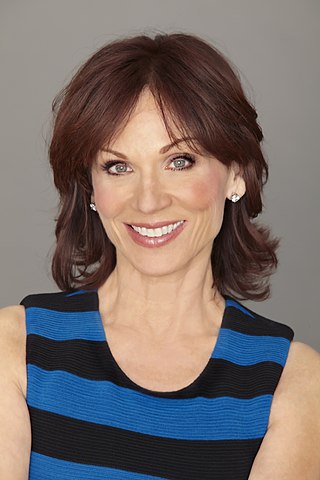
Marilu Henner is an American actress. She began her career appearing in the original production of the musical Grease in 1971, before making her screen debut in the 1977 comedy-drama film Between the Lines. In 1978, Henner was cast in her breakthrough role as Elaine O'Connor Nardo in the ABC/NBC sitcom Taxi, a role she played until 1983 and received five Golden Globe Award nominations for.
Stephen Paul Schnetzer is an American actor, best known for playing Cass Winthrop on Another World from 1982-86, returning in 1987 until the show's cancellation in 1999.
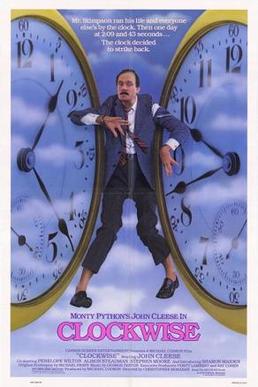
Clockwise is an absurdist 1986 British comedy road film starring John Cleese, directed by Christopher Morahan, written by Michael Frayn and produced by Michael Codron. The film's music was composed by George Fenton.
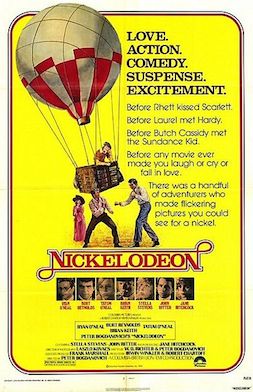
Nickelodeon is a 1976 American comedy film directed by Peter Bogdanovich, and stars Ryan O'Neal, Burt Reynolds and Tatum O'Neal. According to Bogdanovich, the film was based on true stories told to him by silent film directors Allan Dwan and Raoul Walsh. It was entered into the 27th Berlin International Film Festival.

Chimes at Midnight is a 1966 period comedy-drama film written, directed by and starring Orson Welles. The film's plot centres on William Shakespeare's recurring character Sir John Falstaff and the father–son relationship he has with Prince Hal, who must choose between loyalty to his father, King Henry IV, and Falstaff. The English-language film was an international co-production of Spain, France, and Switzerland.

Texasville is a 1990 American drama film written and directed by Peter Bogdanovich. Based on the 1987 novel Texasville by Larry McMurtry, it is a sequel to The Last Picture Show (1971), and features Jeff Bridges, Cybill Shepherd, Cloris Leachman, Timothy Bottoms, Randy Quaid, and Eileen Brennan reprising their roles from the original film.

The Two of Us is a 1970 play by British playwright Michael Frayn. It consists of four one-act plays for two actors and is Frayn's first published play. It was first performed at the Garrick Theatre by Richard Briers and Lynn Redgrave.

The Thing Called Love is a 1993 American comedy-drama film directed by Peter Bogdanovich and starring Samantha Mathis as Miranda Presley, a young musician who tries to make it big in Nashville. River Phoenix, Dermot Mulroney and Sandra Bullock also star. While the film involves a love triangle and various complications in Miranda's route to success, it provides a sweetened glimpse at the lives of aspiring songwriters in Nashville. Its tagline is: "Stand by your dream".
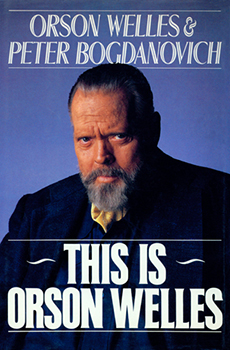
This is Orson Welles is a 1992 book by Orson Welles and Peter Bogdanovich that comprises conversations between the two filmmakers recorded over several years, beginning in 1969. The wide-ranging volume encompasses Welles's life and his own stage, radio, and film work as well as his insights on the work of others. The book was edited after Welles's death, at the request of Welles's longtime companion and professional collaborator, Oja Kodar. Jonathan Rosenbaum drew from several incomplete drafts of the manuscript and many reel-to-reel tapes, most of which had already been transcribed. Much of the dialogue, however, had been rewritten by Welles, often in several drafts.

Nicollette Sheridan is a British-born American actress. She began her career as a fashion model before landing a role in the short-lived ABC primetime soap opera Paper Dolls in 1984, as well as starring in the romantic comedy film The Sure Thing (1985). She rose to prominence as Paige Matheson on the CBS primetime soap opera Knots Landing (1986–1993), for which she received two Soap Opera Digest Awards. Thereafter, Sheridan appeared in lead roles in numerous television films and miniseries, including Lucky Chances (1990), Virus (1995), and The People Next Door (1996). She also appeared in the feature films Noises Off (1992), Spy Hard (1996), Beverly Hills Ninja (1997), and Code Name: The Cleaner (2007).

Strike Me Lucky is a 1934 Australian comedy musical film starring popular stage comic vaudevillian Roy Rene in his first and only film. It was the fourth feature film from Cinesound Productions but proved a box office disappointment. Director Ken G. Hall claimed it was the only one of his features not to go into profit within a few years of release, although the film eventually covered costs.

Horse Eats Hat is a 1936 farce play co-written and directed by Orson Welles and presented under the auspices of the Federal Theatre Project. It was Welles's second WPA production, after his highly successful Voodoo Macbeth. The script, by Edwin Denby and Welles, was an adaptation of the classic French farce The Italian Straw Hat by Eugène Marin Labiche and Marc-Michel.

Rhinoceros was a 1960 production of Eugène Ionesco's surrealist play of the same name, which had been written the year before. It was the first English-language production of the play, starred future husband-and-wife team Laurence Olivier and Joan Plowright, and was directed by Orson Welles. Olivier also co-produced the play, which was Welles's last work as a theatre director.
Othello was a 1951 production of William Shakespeare's play of the same name, which was produced, directed by and starring Orson Welles in his first appearance on the London stage.
Hubert Burton is an English actor best known for his roles as Rusbridger in Living (2022), Wyndham Best in Their Finest (2016) and his role in the premiere production of the play The Inheritance (2018-19).
